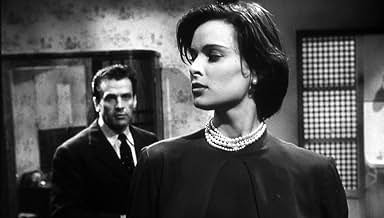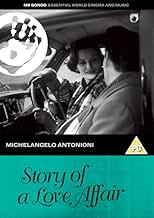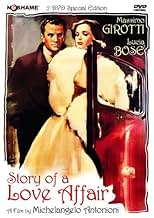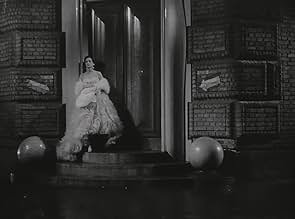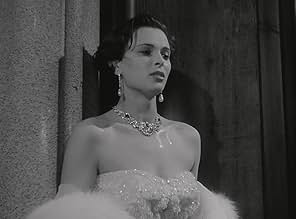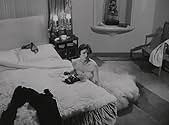NOTE IMDb
7,1/10
3,7 k
MA NOTE
Ajouter une intrigue dans votre languePaola is a young, beautiful woman married to a wealthy entrepreneur. She meets her former lover Guido after seven years, but their relationship is marked by tragic events.Paola is a young, beautiful woman married to a wealthy entrepreneur. She meets her former lover Guido after seven years, but their relationship is marked by tragic events.Paola is a young, beautiful woman married to a wealthy entrepreneur. She meets her former lover Guido after seven years, but their relationship is marked by tragic events.
- Réalisation
- Scénario
- Casting principal
- Récompenses
- 2 victoires et 1 nomination au total
Rubi Dalma
- L'amica snob di Paola
- (as Rubi D'Alma)
Rosi Mirafiore
- La cameriera del bar
- (as Rosi Mirafiori)
Franco Fabrizi
- Il presentatore della sfilata di moda
- (non crédité)
Avis à la une
10andrabem
"Cronaca di un amore" was Antonioni's first full-length film. It's a romantic film noir, full of passion, but very far from the Hollywood saccharine romanticism.
It begins almost as a police film: an investigation is being led about Paola Molon. A detective is walking around, asking questions about her.
Seven years ago, Paola (Lucia Bosé) was in love with Guido (Massimo Girotti). Guido was engaged to Paola's best female friend, but there was already love between Guido and Paola. Still, one day a tragic accident happens. And this accident will tear Guido and Paola apart. And now this investigation will reunite them again. Their love is rekindled.
Paola is now married to a wealthy entrepreneur, lives in a mansion, has servants, a car with chauffeur etc.., but Guido' life has been a constant struggle to make ends meet. (Remember that we are in 1950, some years after the end of the war, and Italy was still far away from her economic boom).....
"Cronaca di un amore" shows already Antonioni as an accomplished master. His eye for small details be it in interior or exterior scenes, his ability in directing actors, his sensitive use of land and cityscape - all these qualities are displayed in full force in the film.
Lucia Bosé is an outstanding actress - she is able to portray intense and contradictory emotions just by her facial expressions. Her acting is subtle and powerful. She's a real diva. Giovanni Fusco's soundtrack is a perfect companion to Antonioni's images.
"Cronaca di un amore" is a very beautiful film.
It begins almost as a police film: an investigation is being led about Paola Molon. A detective is walking around, asking questions about her.
Seven years ago, Paola (Lucia Bosé) was in love with Guido (Massimo Girotti). Guido was engaged to Paola's best female friend, but there was already love between Guido and Paola. Still, one day a tragic accident happens. And this accident will tear Guido and Paola apart. And now this investigation will reunite them again. Their love is rekindled.
Paola is now married to a wealthy entrepreneur, lives in a mansion, has servants, a car with chauffeur etc.., but Guido' life has been a constant struggle to make ends meet. (Remember that we are in 1950, some years after the end of the war, and Italy was still far away from her economic boom).....
"Cronaca di un amore" shows already Antonioni as an accomplished master. His eye for small details be it in interior or exterior scenes, his ability in directing actors, his sensitive use of land and cityscape - all these qualities are displayed in full force in the film.
Lucia Bosé is an outstanding actress - she is able to portray intense and contradictory emotions just by her facial expressions. Her acting is subtle and powerful. She's a real diva. Giovanni Fusco's soundtrack is a perfect companion to Antonioni's images.
"Cronaca di un amore" is a very beautiful film.
The very first feature film of Michelangelo Antonioni, Story of a Love Affair as introduced by Lorenzo Codelli, was a film that dealt with the metaphysics, and had very little neo-realist elements which was a departure from what one would come to expect from a filmmaker whose documentaries were neo-realist. Watching it for the first time, I thought it would make a wonderful thriller/crime-mystery involving two lovers, and I suppose in the hands of Hollywood, we would get just that.
But this is not Hollywood we're talking about, so again I get to throw all standard notions I was weaned on out of the window. As I was warned by a friend, I would be in for a rough ride because whatever structure of story-telling I was familiar with was going to be challenged, and strangely enough, I am beginning to find this challenge quite liberating, like the hitting onto a goldmine or an oilfield, and just raking in the sights and sounds from how beautiful a black and white movie could be, in terms of story, and characters.
However, the characters need not be goody-two-shoes, or perfectly looking beings with zilch problems that they couldn't take care of within 2 hours. There are some serious and complex issues that the leads here have to grapple with, and together with an audience, we try and probe, and discover for ourselves just what those are, though naturally we aren't given all the answers on a sliver platter, and have to work hard at it, sometimes even utilizing some precious moments to breathe, digest, and compute, only being able to scratch the surface.
Whatever the story or mystery is, it never really got addressed, not directly anyway. But story aside, I was really intrigued by the lead characters. We have a beautiful married woman Paola Fontana (played by Lucia Bose whom we'll see later in another Antonioni movie, and at one time the reigning Miss Italy) who seem to have the best of what luxuries life can offer, but is stuck in a loveless marriage to a rich man Enrico (Ferdinando Sarmi). We're told that in her youth, she was a head turner, and almost always changes her boyfriends, each being the alpha-male type.
Surprisingly, her lover whom she maintains contact with, Guido (Massimo Girotti) is anything but an alpha-male type. In fact, I would call him a loser in the classic sense of the word. No real job and penniless, he has some magnetic qualities to be be able to mesmerize Paola into trysts in cheap motel rooms. Meeting on the sly, we see how a high society woman have to dodge around from being discovered, and setting up alibis just to meet Guido, and we soon learn how wicked a woman she can be, for coming up with plans for crime to be committed to get things done her way. Which brings us back to the original thought of how she was involved in a more heinous crime / accident, where she could well be the chief manipulator then made to be seen as the victim.
The main crime thread that got weaved into the story, was one involving a certain unseen Ms Giovanna, whose demise was linked to the two lovers. We never really learned what exactly happened, and Antonioni makes us work in order to try and piece clues and accounts together. And the probing of this mystery by a private investigator serves as a catalyst to the rest of the story, where we first see our lovers meet after a long while, but instead of enjoying each other's embrace, seem a lot more concerned with the PI's probe, as if afraid that it'll uncover hidden skeletons in their closets.
Story of a Love Affair becomes an examination into these 2 characters, and interesting enough, to dwell on the problems that they face, in a somewhat lose-lose situation throughout their relationship. The first was when Giovanna served to be in the way of their coming together, being an in-between, and when that's settled, there's the other more pressing issue of whether they can elope successfully, where pragmatism takes over romanticism with Guido knowing for sure that he has no money, and little means to support both of them, especially the lifestyle that Paola currently enjoys.
Definitely deserves a second viewing to try and develop my thoughts on it further! And to enjoy the beautiful score all over again too!
But this is not Hollywood we're talking about, so again I get to throw all standard notions I was weaned on out of the window. As I was warned by a friend, I would be in for a rough ride because whatever structure of story-telling I was familiar with was going to be challenged, and strangely enough, I am beginning to find this challenge quite liberating, like the hitting onto a goldmine or an oilfield, and just raking in the sights and sounds from how beautiful a black and white movie could be, in terms of story, and characters.
However, the characters need not be goody-two-shoes, or perfectly looking beings with zilch problems that they couldn't take care of within 2 hours. There are some serious and complex issues that the leads here have to grapple with, and together with an audience, we try and probe, and discover for ourselves just what those are, though naturally we aren't given all the answers on a sliver platter, and have to work hard at it, sometimes even utilizing some precious moments to breathe, digest, and compute, only being able to scratch the surface.
Whatever the story or mystery is, it never really got addressed, not directly anyway. But story aside, I was really intrigued by the lead characters. We have a beautiful married woman Paola Fontana (played by Lucia Bose whom we'll see later in another Antonioni movie, and at one time the reigning Miss Italy) who seem to have the best of what luxuries life can offer, but is stuck in a loveless marriage to a rich man Enrico (Ferdinando Sarmi). We're told that in her youth, she was a head turner, and almost always changes her boyfriends, each being the alpha-male type.
Surprisingly, her lover whom she maintains contact with, Guido (Massimo Girotti) is anything but an alpha-male type. In fact, I would call him a loser in the classic sense of the word. No real job and penniless, he has some magnetic qualities to be be able to mesmerize Paola into trysts in cheap motel rooms. Meeting on the sly, we see how a high society woman have to dodge around from being discovered, and setting up alibis just to meet Guido, and we soon learn how wicked a woman she can be, for coming up with plans for crime to be committed to get things done her way. Which brings us back to the original thought of how she was involved in a more heinous crime / accident, where she could well be the chief manipulator then made to be seen as the victim.
The main crime thread that got weaved into the story, was one involving a certain unseen Ms Giovanna, whose demise was linked to the two lovers. We never really learned what exactly happened, and Antonioni makes us work in order to try and piece clues and accounts together. And the probing of this mystery by a private investigator serves as a catalyst to the rest of the story, where we first see our lovers meet after a long while, but instead of enjoying each other's embrace, seem a lot more concerned with the PI's probe, as if afraid that it'll uncover hidden skeletons in their closets.
Story of a Love Affair becomes an examination into these 2 characters, and interesting enough, to dwell on the problems that they face, in a somewhat lose-lose situation throughout their relationship. The first was when Giovanna served to be in the way of their coming together, being an in-between, and when that's settled, there's the other more pressing issue of whether they can elope successfully, where pragmatism takes over romanticism with Guido knowing for sure that he has no money, and little means to support both of them, especially the lifestyle that Paola currently enjoys.
Definitely deserves a second viewing to try and develop my thoughts on it further! And to enjoy the beautiful score all over again too!
Although Antonioni was part of the Italian Nouvelle Vague ,like Fellini,he began as a director of the neorealism school.He did not cut,however, the best of De Sica ,Rossellini and Visconti.
Best part comes from a sensitive Massimo Girotti but he's not really given a scene to shine -as he had in Visconti's "Ossessione" -.Lucia Bosé gives a good but a bit icily impersonal performance.
"Cronaca di un amore" is an interesting movie,if only for the things it forecasts: -the screenplay takes the shape of a private investigation,predating by ten years the second part of "l'avventura" and "blow-up" -the scenes displaying wealthy people living in luxury and exchanging futile conversations will be fully developed in "la Notte" But the most interesting subject is responsibility.Is a crime we intend to commit really a crime?This subject was rarely treated in Italian cinema ."Blow up" will come back to appearances .
Best part comes from a sensitive Massimo Girotti but he's not really given a scene to shine -as he had in Visconti's "Ossessione" -.Lucia Bosé gives a good but a bit icily impersonal performance.
"Cronaca di un amore" is an interesting movie,if only for the things it forecasts: -the screenplay takes the shape of a private investigation,predating by ten years the second part of "l'avventura" and "blow-up" -the scenes displaying wealthy people living in luxury and exchanging futile conversations will be fully developed in "la Notte" But the most interesting subject is responsibility.Is a crime we intend to commit really a crime?This subject was rarely treated in Italian cinema ."Blow up" will come back to appearances .
Suffering is an inate response to life, this is one of the inescapable principles of existence. Antonioni saw far in the career that followed, farther than perhaps any director in cinema, but here he begins where it's proper, with life as a cycle of suffering, a seemingly random pattern of recurring time where we're denied what we most desire, happiness eludes us and our dreams and hopes are thwarted and frustrated.
Too young to see a true reality, Antonioni nonetheless sees clearly the reality of illusions. First that the cycle we call life is not blindly, randomly spun, and that we're to be held accountable for our part in the spinning, foremostly that our pursuit of happiness as we like to think is really the deluded pursuit of satisfying desire.
The crucial point that connects these is, rather poignantly, a death, and it happens not once but twice, mirrored identical the second time like a prefiguration of Vertigo. As with Vertigo, this borrows the world of film noir to speak of karmic wheels and the mechanisms that control them, a Double Indemnity scenario where secret lover and wife calculate to get rid of the rich husband.
In a magical touch, the plotted murder happens of its own accord, seemingly out of the whim of an agent of a higher court passing by.
It's not then just a matter of what begins as thought and desire invariably manifests in imminent reality, this is a powerful inspection of mind, but moreover that having devoted themselves by all means to the pursuit of that desire, a passion born of ego and craving, the obstacle that stood in their way now removed, the two protagonists realize how impotent they remain to pursue that desire, how desire is by its nature an insatiable attribute. Their punishment, which is not divine but of their own doing, is the toll exacted on their conscience.
This first appearance in Antonioni of karma as the force that keeps going the cycle of suffering is not perfect by any means, it seems at the same time to imply questions of moral order, whether or not for example wishing for a crime to happen is a crime in itself, spiritual in nature. And all of this is more verbose than need be, something Antonioni would excise in a few years.
We find things in this debut that Antonioni would elaborate upon in wonderful ways, the ineffability of connection, the city as a cold, alienating limbo where souls in transit struggle for meaning, the transparent reality that extends outside the frame to suggest an entire world and flow of life with or without these characters (indeed we find here, abetting this, the beginnings of his amazing sound work, where the city traffic is always audible), but all these are in nascent form here.
What stands out for me is the true perception that begins to form in Antonioni's cinema. Meaning our idea of reality is just that, an idea born of our own habits and various storytellings, which clouds our soul and needs to be challenged, dismantled, removed from our eyes so that we can see life as it is.
Too young to see a true reality, Antonioni nonetheless sees clearly the reality of illusions. First that the cycle we call life is not blindly, randomly spun, and that we're to be held accountable for our part in the spinning, foremostly that our pursuit of happiness as we like to think is really the deluded pursuit of satisfying desire.
The crucial point that connects these is, rather poignantly, a death, and it happens not once but twice, mirrored identical the second time like a prefiguration of Vertigo. As with Vertigo, this borrows the world of film noir to speak of karmic wheels and the mechanisms that control them, a Double Indemnity scenario where secret lover and wife calculate to get rid of the rich husband.
In a magical touch, the plotted murder happens of its own accord, seemingly out of the whim of an agent of a higher court passing by.
It's not then just a matter of what begins as thought and desire invariably manifests in imminent reality, this is a powerful inspection of mind, but moreover that having devoted themselves by all means to the pursuit of that desire, a passion born of ego and craving, the obstacle that stood in their way now removed, the two protagonists realize how impotent they remain to pursue that desire, how desire is by its nature an insatiable attribute. Their punishment, which is not divine but of their own doing, is the toll exacted on their conscience.
This first appearance in Antonioni of karma as the force that keeps going the cycle of suffering is not perfect by any means, it seems at the same time to imply questions of moral order, whether or not for example wishing for a crime to happen is a crime in itself, spiritual in nature. And all of this is more verbose than need be, something Antonioni would excise in a few years.
We find things in this debut that Antonioni would elaborate upon in wonderful ways, the ineffability of connection, the city as a cold, alienating limbo where souls in transit struggle for meaning, the transparent reality that extends outside the frame to suggest an entire world and flow of life with or without these characters (indeed we find here, abetting this, the beginnings of his amazing sound work, where the city traffic is always audible), but all these are in nascent form here.
What stands out for me is the true perception that begins to form in Antonioni's cinema. Meaning our idea of reality is just that, an idea born of our own habits and various storytellings, which clouds our soul and needs to be challenged, dismantled, removed from our eyes so that we can see life as it is.
The feature film debut of future Italian cinema star Michelangelo Antonioni is quite conventional and straightforward as compared to his later works, which are generally regarded as masterpieces. Though not in that category, this film ranks as a very well-made melodrama that dares to also include exploration of the darkest of human desires, specifically within the context of marriage and fidelity.
Chance also plays a large role here, helping to reunite former lovers who pick up where they left off, ironically thanks to the woman's husband hiring a private detective to follow her as he suspects she is having an affair. What follows is often high-strung, dense and very moving as Antonioni shows us the most desolate shots of the beautiful city Milan. Many of the establishing shots are long shots of corridors, streets and other walkways that create great sense of alienation, isolation and illicit activities. The ending may require a bit of explaining but still fits the overall tone of elegy and bitter sadness. A powerful and moving Italian melodrama that certainly could be used as a template for American filmmakers today.
Chance also plays a large role here, helping to reunite former lovers who pick up where they left off, ironically thanks to the woman's husband hiring a private detective to follow her as he suspects she is having an affair. What follows is often high-strung, dense and very moving as Antonioni shows us the most desolate shots of the beautiful city Milan. Many of the establishing shots are long shots of corridors, streets and other walkways that create great sense of alienation, isolation and illicit activities. The ending may require a bit of explaining but still fits the overall tone of elegy and bitter sadness. A powerful and moving Italian melodrama that certainly could be used as a template for American filmmakers today.
Le saviez-vous
- AnecdotesMichelangelo Antonioni's feature film directorial debut. He wanted to cast Gene Tierney as Paola, but since he was an unknown European director he could not get her. Eventually he met then 19 year old Lucia Bosè, who had been Miss Italy 1947, while having lunch at fellow director Luchino Visconti's house. While initially skeptical over her maturity, Visconti convinced him to audition her.
- GaffesAfter Paola says, "Leave me alone," the camera moves to follow her as she collapses onto her bed. In the upper right corner of the frame, a white drape can be briefly seen before it is pulled out of the path of the camera.
- ConnexionsFeatured in Les films de Marco Ferreri (2008)
Meilleurs choix
Connectez-vous pour évaluer et suivre la liste de favoris afin de recevoir des recommandations personnalisées
- How long is Story of a Love Affair?Alimenté par Alexa
Détails
Box-office
- Montant brut mondial
- 528 $US
- Durée1 heure 38 minutes
- Couleur
- Rapport de forme
- 1.37 : 1
Contribuer à cette page
Suggérer une modification ou ajouter du contenu manquant

Lacune principale
By what name was Chronique d'un amour (1950) officially released in India in English?
Répondre

